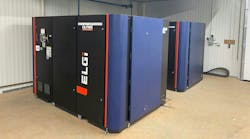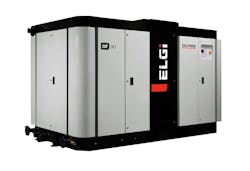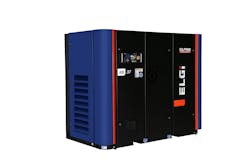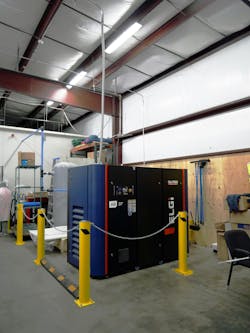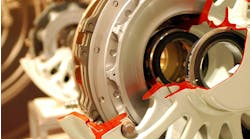The Differences Between Oil-Free and Oil-Lubricated Air Compressors
Air compressors are an important part of pneumatic systems as they provide the air which moves through and powers the system. There are various types of air compressors available in the market, including those which are oil lubricated and oil free.
The key differentiator between the two types is one uses oil to lubricate components and keep the compressor from getting too hot during operation while the other does not.
Each type offers various advantages and disadvantages. Understanding the differences between oil-free and oil-lubricated air compressors can ensure the right option is chosen for a given application.
Oil-Free vs. Oil-Lubricated Air Compressors: The Pros and Cons
Oil-free and oil-lubricated air compressors work based on the same principles, but their method of lubrication does factor into their costs, performance, and maintenance requirements.
As their name suggests, oil-lubricated compressors (also called oil-flooded) use mineral or synthetic oil to lubricate components within the system. Robert Horneman, Product Manager at ELGi Industrial – a developer of air compressors – said the oil in these compressors has three main functions:
- seal the housing between the rotor and the compressor,
- cool the air which can get very hot when compressed, and
- lubricate the compressor’s bearings.
Using oil helps to provide more efficient operation because less heat is generated. Components will last longer as well because they are well lubricated, minimizing their wear. However, there is often more maintenance involved because the oil and filters need to be changed periodically to ensure performance and minimize contamination.
Oil-free air compressors use other methods for lubrication besides oil such as water, special coatings or are constructed to prevent mechanical contact. The lack of oil moving through the system eliminates the possibility of oil mist in the outlet air as well as potential oil leaks or spills.
However, Horneman said there is the drawback of the air compressor running hotter and less efficiently because there is no oil to cool the air or seal the housing. The air dryer used with the compressor – to take moisture out of the system – often needs to be larger for oil-free options to compensate for the extra heat generated. The life expectancy for an oil-free air compressor is lower as well because of the lack of oil for lubrication.
“It's very important when you start looking at which is best for your needs that you take into account the pros and cons of each [air compressor type],” said Horneman.
He explained that no compressed air application wants oil in the air, so it is a matter of determining how best to mitigate that through selection of the right technology.
“This is really starting to take off in the marketplace because the drawbacks of an oil-free compressor are somewhat mitigated by having water in the system,” said Horneman. “Now you have a cooler running machine, [and] it is as efficient as an oil-flooded compressor.”
With this air compressor, the environmental concerns associated with oil-lubricated compressors are also overcome as there is no need to worry about oil spills.
Horneman noted the water-lubricated option does not have as high a horsepower range as other air compressors but if that is not a factor for your application then it could be a good fit which overcomes the drawbacks associated with oil-lubricated and oil-free compressors.
READ MORE about air compressor designs in the article "Pneumatic Basics: Air Compressors."
Watch our video interview below with Horneman to learn more about the differences between oil-free and oil-lubricated air compressors.
How to Choose Between an Oil-Free and Oil-Lubricated Air Compressor
According to Horneman, risk is the biggest factor to consider when determining whether to use an oil-free or oil-lubricated air compressor. He said any high-risk application in which the presence of oil could cause catastrophic effects would be one in which it would be better to consider using an oil-free air compressor.
While oil-lubricated compressors include filters to remove oil from the air, “if you forget to change a filter you now have a risk of that oil getting downstream,” he noted. That could cause health and environmental issues or contaminate products.
Food and beverage production, textiles, oil and gas, as well as pharmaceuticals and electronics are some of the industries in which Horneman said oil-free air compressors are being used the most. He noted the electronics industry is almost exclusively using oil-free compressors. “These are the industries…we cannot take the risk of any oil coming downstream.”
Besides high-risk applications, he said those which have a low tolerance for environmental impacts are also showing interest in using oil-free air compressors. With oil-lubricated options, the oil which runs through the compressor needs to go somewhere; there is cleanup equipment such as dryers and filters, but something still needs to be done with the oil that is filtered out of the compressor.
Horneman said there are oil water separators which treat the condensate and oil coming from the compressor system. Then users can dispose of the oil like they would any other waste oil. However, there are costs and maintenance involved which need to be taken into consideration.
“All these decisions start impacting your thinking about what technology [to look at],” he said.
Costs are an important consideration when deciding which type of air compressor to use. Although oil-lubricated versions have environmental concerns, maintenance, and additional equipment costs to take into account, they also run more efficiently. “Because the oil is closing the distance between the rotor and the housing, it makes the compressor a lot more efficient and you get more airflow out of it for less input power,” explained Horneman.
Oil-free air compressors, in comparison, have a higher purchase cost and are less efficient so will require more energy to be used, leading to increased operational costs. However, the cleanup equipment used with oil-lubricated compressors also creates a pressure drop which the compressor has to overcome and could impact costs.
Choosing an air compressor which meets application, cost and other requirements can feel overwhelming with all the factors that need to be considered. Horneman suggests working with an industry partner which sells both types and can help flesh out all the necessary details to select the right compressor.
READ MORE: Determine the Cost of Compressed Air for Your Plant
Oil-Free Air Compressors on Growth Trajectory
Horneman said the market appears to be trending toward increased use of oil-free air compressors because of the many benefits they can provide. The environmental factor is becoming increasingly important to customers and industries.
Eliminating the use of oil in air compressors is a big help toward meeting companies’ various sustainability goals. And with the introduction of ELGi’s AB Series, those who may have been hesitant to use an oil-free air compressor are now more likely to do so as they feel more comfortable with the benefits offered by using water as a lubricant in these compressors.
Continued growth of the pharmaceutical industry is also driving greater use of oil-free air compressors. This industry requires extremely clean, safe conditions in which to manufacture products – something which oil-free air compressors can help provide.
Besides the cleanliness benefits offered, Horneman believes the lower long-term costs associated with oil-free air compressors will also help increase their use in the pharmaceutical and other industries going forward.
READ MORE: Ensure Pneumatic Compressors Reliability with Proper Lubrication
